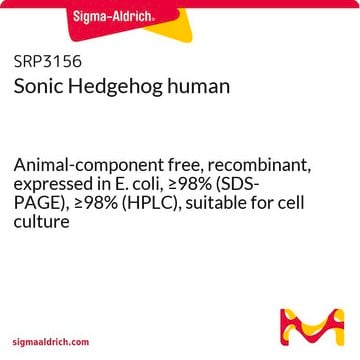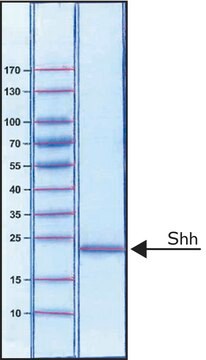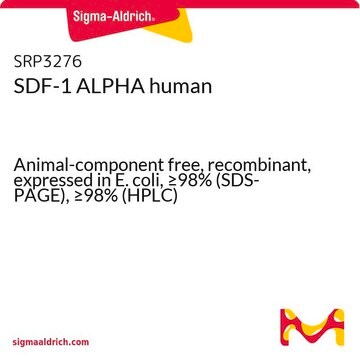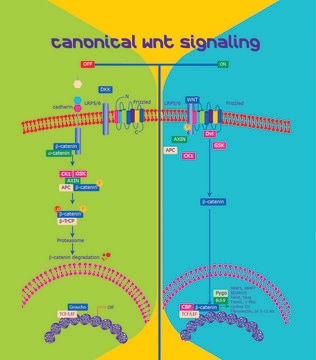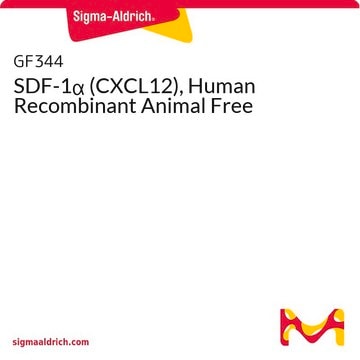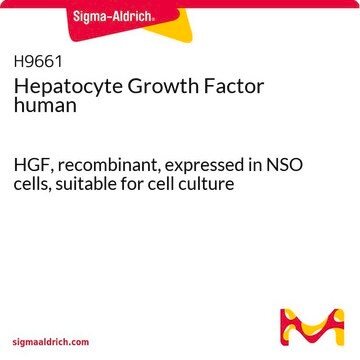GF174
Sonic HedgeHog (Shh) Protein, Human Recombinant
The hedgehog (hh) gene encoding a secreted protein was originally identified in Drosophila as a segment polarity gene.
Synonym(s):
SHH, HHG-1
Sign Into View Organizational & Contract Pricing
All Photos(1)
About This Item
UNSPSC Code:
12352202
eCl@ss:
32160405
NACRES:
NA.77
Recommended Products
General description
Product Source: E. coli.
The hedgehog (hh) gene encoding a secreted protein was originally identified in Drosophila as a segment polarity gene. The vertebrate homologues of hh comprise several proteins including sonic hedgehog (Shh), Indian hedgehog (Ihh), and Desert hedgehog (Dhh). Hedgehog proteins are important signaling molecules during embryonic development. Shh is expressed in key embryonic tissues such as the Hensen’s node, the zone of polarizing activity in the posterior limb bud, the notochord, and the floor plate of the neural tube. Shh is involved in regulating the patterning of the developing central nervous system, somite, and limb. Shh plays an important role in the development of particular tissues such as whisker, hair, foregut, tooth and bone. Evidence also suggests that Shh is involved in regulating stem cell fates of neural and hematopoietic lineages, and that aberrant Shh signaling is implicated in basal cell carcinomas and other diseases. Shh genes are highly conserved and have been identified in a variety of species including human, mouse, frog, fish, and chicken. Recombinant E. coli derived Human Sonic HedgeHog is a 20.0 kDa protein consisting of 176 amino acid residues, including an N-terminal Ile-Val-Ile sequence substituted for the natural occurring chemically modified Cys residue.
Specificity
Cross Reactivty
None
None
Application
Research Category
Stem Cell Research
Stem Cell Research
Research Sub Category
Growth Factors & Receptors
Growth Factors & Receptors
Quality
Bioactivity assay: Determined by its ability to induce alkaline phosphatase production by C3H/10T1/2 (CCL-226) cells. The expected ED50 for this effect is 0.8-1.0 μg/ml.
Physical form
Product is filtered through a 0.2 micron filter before lyophilization.
Storage and Stability
Store at -20°C for up to 6 months from date of receipt.
Disclaimer
Unless otherwise stated in our catalog or other company documentation accompanying the product(s), our products are intended for research use only and are not to be used for any other purpose, which includes but is not limited to, unauthorized commercial uses, in vitro diagnostic uses, ex vivo or in vivo therapeutic uses or any type of consumption or application to humans or animals.
Storage Class
11 - Combustible Solids
wgk_germany
WGK 1
flash_point_f
Not applicable
flash_point_c
Not applicable
Certificates of Analysis (COA)
Search for Certificates of Analysis (COA) by entering the products Lot/Batch Number. Lot and Batch Numbers can be found on a product’s label following the words ‘Lot’ or ‘Batch’.
Already Own This Product?
Find documentation for the products that you have recently purchased in the Document Library.
Thais Basili et al.
International journal of cancer, 147(8), 2253-2264 (2020-05-10)
Hyalinizing trabecular tumors of the thyroid are rare and mostly benign epithelial neoplasms of follicular cell origin, which have recently been shown to be underpinned by the PAX8-GLIS3 fusion gene. In our study, we sought to investigate the potential oncogenic
Our team of scientists has experience in all areas of research including Life Science, Material Science, Chemical Synthesis, Chromatography, Analytical and many others.
Contact Technical Service